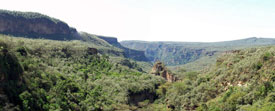 Naivasha is a very old town in the Great Rift Valley, which was started during the construction of the railway line in 1800’s. The railway line passed through there on its way to Uganda, near lake Victoria which is the source of river Nile, which serves water in Sudan, Ethiopia and Egypt countries in Africa. This is a town which is famous for wildlife and some of white settler like Lord Dalemere lived here and his grandson has a farm in the area. It houses one of the big prisons in Kenya. It is a warm town near the lake and many whites have bought farms to grow flowers. It is a tourist attraction site since it is so beautiful because of the wild animals walking freely even near the roads. Here we feed many moneys with sweets and fruits from the buses as we go to western parts of the country. Monkeys stop the buses like policemen and we throw food through the bus windows. Zebras and giraffes also cross the roads and the bus wait to move. Many rich people have built cottages and hotels in this area. Wealthy expatriates have also build children homes, homes for the aged, and rescued prostitutes are just about to get a home and skills after the completion of their home.
Naivasha is a very old town in the Great Rift Valley, which was started during the construction of the railway line in 1800’s. The railway line passed through there on its way to Uganda, near lake Victoria which is the source of river Nile, which serves water in Sudan, Ethiopia and Egypt countries in Africa. This is a town which is famous for wildlife and some of white settler like Lord Dalemere lived here and his grandson has a farm in the area. It houses one of the big prisons in Kenya. It is a warm town near the lake and many whites have bought farms to grow flowers. It is a tourist attraction site since it is so beautiful because of the wild animals walking freely even near the roads. Here we feed many moneys with sweets and fruits from the buses as we go to western parts of the country. Monkeys stop the buses like policemen and we throw food through the bus windows. Zebras and giraffes also cross the roads and the bus wait to move. Many rich people have built cottages and hotels in this area. Wealthy expatriates have also build children homes, homes for the aged, and rescued prostitutes are just about to get a home and skills after the completion of their home.
Naivasha town was badly hit by the war in 2008. Very many people died andmany displaced. Many women lost their lives and children burnt as they lost way when their parent died and ran away. This town is coming up again slowly, but many people ended in prison as many were regarded as inciters during the post violence clashes. Many women were jailed due to child negligence. They had no jobs and they decided to run away leaving their children behind. This led them to being sorted by the government and got jailed for many years as their children got adopted by their poor families.
The election took place in December 2007 during Christmas time, and I had just been issued a letter to stop working, since that Bank I worked for was not making profits and had to reduce staff. I got very stressed being a first born, the only employed person in the family of ten who was the bread winner. My child had just completed primary school and was due to join form high school, the following year. I had no words to tell him that he may not be able to continue with schooling since I had lost my job. I had no words to tell my mother and family that I will not be able to support them and buy their medicines. I could not afford insurance either. In Africa the first born child must take care of the family when parents die. My father had died and in our culture, I was to take over all the responsibilities. I left my province and went to live in the rift valley province with my aunt to settle my mind, think my way forward after the job cut and the same time help them in the farms.
Reaching the Rift valley province I was unlucky. Leaflets were dropped all over, requesting my tribe to leave the area since the land belong to Kalenjin tribe. I thought it was just politics, and would settle, because we are used to being beaten in elections every five years and displacements must take place during this time. It is normal to be beaten in this area.
I thought I will just ran away and stay in a Catholic church awaiting the end of tri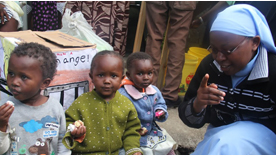 bal crashes which will soon
bal crashes which will soon
subside and then leave for home in Central province where my mother and other siblings stay. My Aunt thought I should in the forest at night and come home during the day as this is what the trend was for many years during elections. This was not the case this time. When I slept in the forest, I slept in trees like the other people who were running from the killers. We slept in trees because the animals were as dangerous as the criminals)
In around evening when the sun was going down, The African Horns were blown. This is how we communicate. It was a sign something bad was going to happen and already people are in danger. Soon fires were lit and smoke filled the area, in Africa the horns communicates danger and people were screaming but not the 5 screams for the birth of a baby boy or 4 screams for a baby girl being born but continuous screams that an enemy has already arrived was attacking our people. It was war.
I rushed inside into my Aunts’ African thatched hut and opened our Radios in our vernacular. I tried to open other languages but could not understand what they were announcing. I heard we were in danger and should move to police stations and nearby churches and possibly Catholic Church which is not a tribal church. In an hour’s time Rift valley was dark. No power connections. It was very quiet.
The small shops were closed and looted. I had no air time on my phone and could not call my mother in central Kenya. People were being killed all over with poisoned arrows. If a poisoned arrow touches a human being they would just fall and die instantly. My Aunt and I with many others moved to the Catholic church and police stations. The place was overcrowded within minutes. We stayed in the police station till morning without water and food. Neither the Red Cross nor the UN planes had reached us yet. The Kenya army had taken sides. We even feared to tell them who we were which one was our tribe in fear of being killed. I could not go to the forest. Many criminals and hostile tribes were there during the day and killing people at night.
During the day I could accompany my aunt and everyone to look for the missing people. We could identify those fallen dead with arrows on their bodies. Many women were raped and left for dead. There were very many. With the help of the police we could bring them to the station for checkup.
Pregnant women were cut open and laying dead with babies dead in the stomachs. The Hostile tribes found us the fourth day. I had gone home and they almost killed me and my aunt, threatening to burn our hut. We pleaded with them. One man said he knows my cousin who lives in America and as a pastor in the area he assisted his relative to study here in Kenya. He managed to intervene and we narrowly escaped death. My aunt and I went back to the church until the government gave a directive that we were to be escorted by the army and taken to other provinces where there was no war.
I was among the people to be put in the Eldoret Bus Services which was contracted by the government to move us from the Rift valley with the help of army escort. I left my Aunt and thought of taking risk to be in the first group since I thought my mother and my son are spending sleepless nights. They would be very worried about me. I left the town with a bottle of water given by the government through the church. I was hungry due to scramble for food which I did not manage to get. I had no shoes and with dirty clothes I left for Nairobi with only my national Identity Card. On the road I could see criminals waiting for the buses, but once they saw the army they ran back to the forest. We could fight fires on the highway to stop the bus moving but the escort could come out and tribes ran away.
With only 150 Km to Nairobi, at Naivasha, near the lake Naivasha in the Great Rift Valley, my bus was stopped by heavily armed people .They had guns, arrows and machetes (African swords). They were in Kenya Army Uniforms. I knew I would die then. They shot at the escort and overpowered them and their vehicle and a tire was popped. We were all taken from the bus and lined up. We were told to remove our Identity card and put it on our mouths.
God was on my side. The tribal criminals were from my tribe and taking revenge because of the tribe’s men being killed in the rift Valley. All the Kikuyu tribe went back to the bus holding their cards. All the Kikuyu young people were put in a lorry to become fighters in the town. They were given arrows immediately. Those with no cards were greeted in the Kikuyu language. Many who did not respond were known to be other tribes. They were told to be left. The driver was instructed to move. The bus left going very quickly but before we could reach few meters we could see and hear gun shots as these people were all killed.
Naivasha town was mostly hit in 2007 post violence crashes. We continued without Army escort. Many people were dumped in Limuru, near St. Paul’s university at a place called KIRATHIMO(blessing). Here the Red Cross was waiting for the hungry and injured, giving tents and blankets to women and children as they arrived.
My bus reached Nairobi and found the Red Cross still waiting for us. I got water and painkillers. I borrowed a phone and called my mother. I was given fare and left for my room where I live. Reaching home I fell sick due to cold and stress. We were never counseled about our trauma even after the war. Churches had already started collecting clothes to take near St. Paul’s and I managed to get some clothes during the church service. Back in the Rift valley my aunt stayed in church and the Red Cross and UN were able to help them.
During this war all the families lived together. Men, women, children and everybody else regardless their age group. Many women were raped. Many girls left school and become mothers at a very tender age. Children suffered colds and diseases due to dirty water. Many people later tested H.I.V. and A.I.Ds positive since they mixed with other tribes and without protection they became sick. Very many unwanted pregnancies were reported. Men ran away and left children and women. They got an opportunity to leave their responsibilities and went to stay in other provinces with other women. This also spread H.I.V to other provinces.
During this time maize which was the subsistence crop was burnt down. Animals killed and stolen. People were being fed by the UN with maize, flour and cooking oil. They brought mosquito nets and blankets for children.
As negotiations were taking place in Nairobi, women and children were suffering in camps. My own child who was to join high school was late because i could not get results on time. I also feared to go to Naivasha where he studied to collect results later due to what I went through. Many investors run away. I could not get a job any more. The economy corrupted. My child went to school later through the help of a friend. In one year and nine month I met Prof. Esther where women were giving their stories. She asked me to put the child in boarding school and go back to university. I graduated last year October with a Bachelor of Divinity and have just completed a post graduate diploma in Church law and marriage cases in catholic university.
God has been with me, and this is where am.
We like to note for our readers the amazing resiliency so many of our interviewees have. Grace has applied for a doctoral program in Anthropology. She struggles with poverty as most single women do and lives in a tin house. We were Skyping and there was a terrible noise like war, like thunder, like a million cymbals and I couldn’t hear a word of what Grace was saying. There was a pause and she told me she lives in a tin house (sheet metal to us in the US) and this is what happens with wind and storms. She has occasional electricity but often studies by candle light.
Right now she is trying to find the money to buy reading glasses and still she perseveres. And oh, she walks everywhere and when she can hires a motorbike rider to take her places. She walks 35 kilometers to visit her mother. She says this is what makes Kenyans such good athletes — they walk and run everywhere.




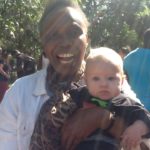
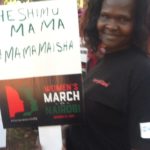
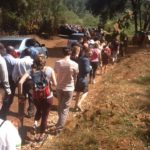
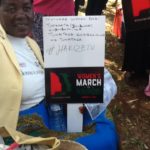
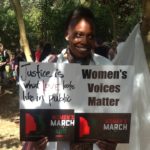
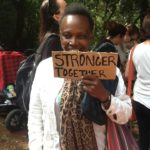

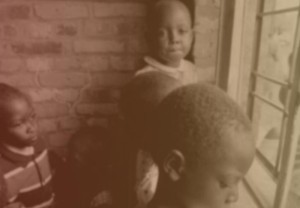

 bal crashes which will soon
bal crashes which will soon